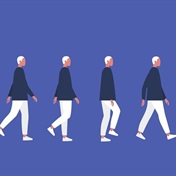"It's a broad-based trait that is particularly about impulse control, self-discipline and delayed gratification," said Robert S. Wilson, professor of neuropsychology at the Rush University Medical Centre in Chicago and lead author of a report in the October Archives of General Psychiatry.
The finding is the latest from the study, which began in 1994. Previous reports have noted that people who suppress their rage rather than venting it are more likely to die young and that more years of schooling preserve cognitive function.
When the trial began, the participants were read statements such as, "When I make a commitment, I can always be counted upon to come through," designed to test their conscientiousness, and rated their agreement with each of 12 items. The test was repeated annually.
Double the risk"We've been following up for 12 years, and people who are low in the conscientious trait are about twice as likely to develop Alzheimer's disease," Wilson said. "That is true even when we controlled for other personality traits and risk factors and also how people were physically, cognitively and socially active."
In the overall spectrum of personality-based risk factors, conscientiousness ranked at the top and was as important as neuroticism in determining whether a person would develop Alzheimer's disease, Wilson said.
Just how conscientiousness affects Alzheimer's risk remains unknown, he said. Autopsies show no difference in brain damage related to the self-ratings of the trait, Wilson said.
"Is it a risk factor itself or a proxy for something else?" Wilson asked. "It does seem to be identifying something new that is not captured by other risk factors."
One important factor is that conscientiousness tends to grow with age, as people take on more responsibilities, Wilson said. "If in old age you have been unable to show that kind of growth, if people are unable to learn from experience, that might have implications for brain structure."
Role for cardiovascular systemThere could also be a physical mechanism related to the cardiovascular system, said Brent Roberts, a professor of psychology at the University of Illinois.
"Conscientiousness deletes risk factors that cause premature death, such as smoking and drinking and driving," he said.
"One possibility is that if you look at what doctors call cognitive decline, it is related to cardiovascular disease. It is completely speculative, but people who are less conscientious are more likely to smoke more and exercise less. But it could be something completely different, something we have yet to identify."
Understanding the relationship between conscientiousness and Alzheimer's risk may suggest novel strategies for delaying the symptoms of Alzheimer's disease, the journal report said.
Education brings down riskIn a related study, people who don't complete high school are more likely to develop dementia and Alzheimer's disease than those with more education, Finnish researchers report in the Oct. 2 issue of the journal Neurology.
The finding, from a study of almost 1 400 people, found that this association was independent of lifestyle factors such as occupation, income, physical activity and smoking.
The study participants were divided into three groups - five or less years of education (low), six to eight years (medium), and nine or more years (high). The researchers tracked their outcomes through middle age and late life, for an average of 21 years.
80% lower riskCompared to people with a low education level, those with a medium level were 40 percent less likely to develop dementia, and people with a high level of education had an 80 percent lower risk, the study found.
"Generally speaking, people with low education levels seem to lead unhealthier lifestyles, which could suggest the two work concurrently to contribute to dementia or Alzheimer's disease, but our results showed a person's education predicted dementia on its own," study author Dr Tiia Ngandu, of the University of Kuopio, said in a prepared statement.
"It may be that highly educated people have a greater cognitive reserve, which is the brain's ability to maintain function in spite of damage, thus making it easier to postpone the negative effects of dementia. Additionally, unhealthy lifestyles may independently contribute to the depletion of this reserve," Ngandu said. – (HealthDayNews)
Read more:Alzheimer’s Centre
October 2007




 Publications
Publications
 Partners
Partners










